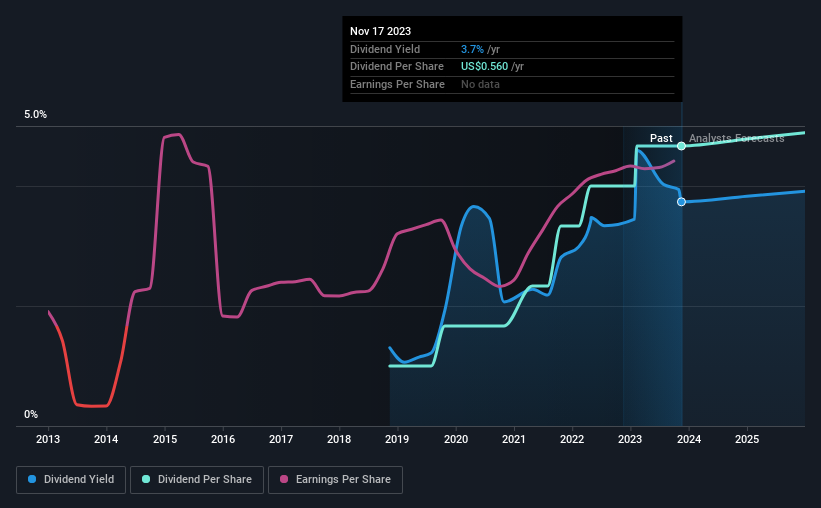Should You Buy First BanCorp. (NYSE:FBP) For Its Upcoming Dividend?
It looks like First BanCorp. (NYSE:FBP) is about to go ex-dividend in the next 4 days. The ex-dividend date is one business day before the record date, which is the cut-off date for shareholders to be present on the company's books to be eligible for a dividend payment. The ex-dividend date is important as the process of settlement involves two full business days. So if you miss that date, you would not show up on the company's books on the record date. Accordingly, First BanCorp investors that purchase the stock on or after the 22nd of November will not receive the dividend, which will be paid on the 8th of December.
The company's next dividend payment will be US$0.14 per share. Last year, in total, the company distributed US$0.56 to shareholders. Based on the last year's worth of payments, First BanCorp stock has a trailing yield of around 3.7% on the current share price of $14.99. Dividends are an important source of income to many shareholders, but the health of the business is crucial to maintaining those dividends. That's why we should always check whether the dividend payments appear sustainable, and if the company is growing.
View our latest analysis for First BanCorp
If a company pays out more in dividends than it earned, then the dividend might become unsustainable - hardly an ideal situation. First BanCorp paid out a comfortable 33% of its profit last year.
Generally speaking, the lower a company's payout ratios, the more resilient its dividend usually is.
Click here to see the company's payout ratio, plus analyst estimates of its future dividends.
Have Earnings And Dividends Been Growing?
Businesses with strong growth prospects usually make the best dividend payers, because it's easier to grow dividends when earnings per share are improving. Investors love dividends, so if earnings fall and the dividend is reduced, expect a stock to be sold off heavily at the same time. It's encouraging to see First BanCorp has grown its earnings rapidly, up 42% a year for the past five years.
The main way most investors will assess a company's dividend prospects is by checking the historical rate of dividend growth. In the last five years, First BanCorp has lifted its dividend by approximately 36% a year on average. It's great to see earnings per share growing rapidly over several years, and dividends per share growing right along with it.
Final Takeaway
From a dividend perspective, should investors buy or avoid First BanCorp? Typically, companies that are growing rapidly and paying out a low fraction of earnings are keeping the profits for reinvestment in the business. Perhaps even more importantly - this can sometimes signal management is focused on the long term future of the business. We think this is a pretty attractive combination, and would be interested in investigating First BanCorp more closely.
So while First BanCorp looks good from a dividend perspective, it's always worthwhile being up to date with the risks involved in this stock. For example, we've found 2 warning signs for First BanCorp (1 can't be ignored!) that deserve your attention before investing in the shares.
A common investing mistake is buying the first interesting stock you see. Here you can find a full list of high-yield dividend stocks.
Have feedback on this article? Concerned about the content? Get in touch with us directly. Alternatively, email editorial-team (at) simplywallst.com.
This article by Simply Wall St is general in nature. We provide commentary based on historical data and analyst forecasts only using an unbiased methodology and our articles are not intended to be financial advice. It does not constitute a recommendation to buy or sell any stock, and does not take account of your objectives, or your financial situation. We aim to bring you long-term focused analysis driven by fundamental data. Note that our analysis may not factor in the latest price-sensitive company announcements or qualitative material. Simply Wall St has no position in any stocks mentioned.

